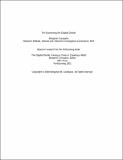Re-Examining the Digital Divide
| dc.contributor.author | Compaine, Benjamin | |
| dc.date.accessioned | 2002-07-22T19:52:41Z | |
| dc.date.available | 2002-07-22T19:52:41Z | |
| dc.date.issued | 2000-09 | |
| dc.identifier.uri | http://hdl.handle.net/1721.1/1521 | |
| dc.description.abstract | Much media and public policy attention has been attended to a presumed ?Digital Divide.? This refers to those who have access to information tools and the capability of using information and those who presumably do not. This paper looks at the forces and trends in the information technologies themselves and the economics of information. It concludes that the divide at its outset was much the same as many gaps that have and continue to persist in a capitalistic society. It further concludes that costs are falling so steeply and ease of use improving so rapidly that market forces already seem to me eliminating the greatest portion of the divide. Policy-makers may have less of an issue to deal with in a few years than seemed likely just a few years ago. | en |
| dc.format.extent | 157349 bytes | |
| dc.format.mimetype | application/pdf | |
| dc.language.iso | en_US | |
| dc.subject | digital divide | en |
| dc.title | Re-Examining the Digital Divide | en |
Files in this item
This item appears in the following Collection(s)
-
Program on Internet and Telecoms Convergence
Research to identify and shape solutions to technical, economic, or policy hurdles slowing the Internet's evolution as a global communications infrastructure
